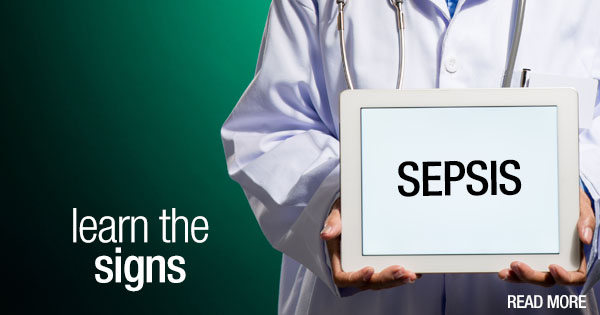Sepsis takes a life every two minutes. More than 1.7 million people in the U.S. are diagnosed with sepsis each year – one every 20 seconds.
With 270,000 people dying from sepsis in the United States each year, it is a prevalent ailment. However, few people know the signs and symptoms of sepsis. Do you?
The Sepsis Alliance encourages people to remember the signs and symptoms of sepsis using their TIME acronym. The alliance says, “When it comes to sepsis, remember it’s about time.”
Watch for the following:
T – Temperature – Higher or lower than normal
I – Infection – You may have signs and symptoms of an infection
M – Mental decline – confusion, sleepy, difficult to rouse
E – Extremely ill – severe pain or discomfort
If you recognize a combination of the above symptoms or you suspect sepsis you should see a doctor immediately. Call 911 or come to the hospital.
Sepsis is the body’s overwhelming response to infection. It can lead to tissue damage, organ failure, amputations and death. The risk of death from sepsis increases by as much as eight percent for every hour that treatment is delayed. It is crucial to seek medical care as soon as possible to access rapid diagnosis and treatment.
Preventing Sepsis
Sepsis can be caused by any type of infection anywhere in the body. Many infections can be prevented by good and consistent hygiene. Hand washing does prevent the spread of infections which can lead to sepsis.
If you have an infection and are prescribed antibiotics by your physician it is important to always follow the instructions regarding how the medication should be taken. You should always finish the full course of antibiotics even if you begin to feel better before the course is complete. Oftentimes the symptoms will disappear before the infection has been completely eliminated.
Risk Factors
Some people are more likely to experience sepsis than others. The very young and very old are both at a higher risk of developing sepsis. Additionally, those people with chronic or serious illnesses, like diabetes and cancer are also at an increased risk.
It is important to remember that even individuals who are not in high risk categories can still develop sepsis. Always be aware of the signs and symptoms of sepsis and seek medical attention quickly if you are concerned about sepsis.

